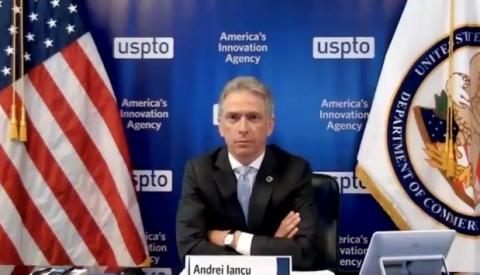USPTO Director Iancu ’96 Joins Probing Ziffren IN-DC Discussion

The Ziffren Institute for Media, Entertainment, Technology and Sports Law at UCLA Law was excited to host distinguished alumnus Andrei Iancu ’96, Director of the U.S. Patent and Trademark Office (USPTO) and Under Secretary of Commerce for Intellectual Property, on October 15, as part of its signature IN-DC series.
Co-sponsored by UCLA Law’s student-run Intellectual Property Law Association, the discussion was moderated by Professor Doug Lichtman and touched on a wide array of topics before a live virtual audience of more than 100 people.
Iancu discussed the unique role of the USPTO in response to COVID-19, including new changes to the patent provisional application process, such as deferring filing fees for applicants who were willing to voluntarily publish their discoveries earlier, in an effort to create more information-sharing during this critical time. Iancu stressed that the USPTO was doing its part to foster innovation to address the global pandemic while still ensuring the quality of applications and respecting global intellectual property frameworks.
He also identified several systemic issues that he has sought to improve during his current tenure. He acknowledged that the area of subject matter eligibility is in flux and often filled with confusion. But he added that efforts by the USPTO to better synthesize the framework of case law has tremendously helped applicants and examiners. Specifically, metrics of examination have improved greatly, examination uncertainty has dropped by more than 40% and the number of application rejections have also decreased. Iancu also addressed how IPRs, or inter partes reviews, can be abused. In response, the USPTO has tried to eliminate the frivolous filing of petitions and challenges. Ultimately, he emphasized the importance of preserving fairness and balance when addressing systemic challenges in the patent process.
Finally, Iancu recognized the need to improve diversity and inclusion in the patent process. He acknowledged that demographics are often skewed to favor specific groups of people in ethnicity, gender, geographic location and economic class, and he stressed the USPTO’s current push to gather public input and maintain discussions about making innovation a more inclusive space. As he stated, a system that only benefits a few leads the United States to compete in an extremely competitive global ecosystem “with one hand and several fingers tied behind its back.” By increasing inclusivity and diversity, Iancu stressed that innovation could again become the “great unifier” of our country.